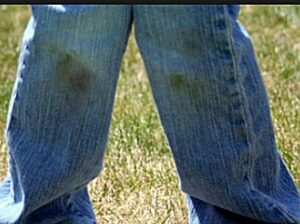Most grass stains can be removed simply by washing the item according to the care instructions, particularly when the stain is fresh. However, if the stain has been allowed to set or proves to be difficult to get out or eliminate you may want to think of other treatments or methods.
Removing Stains from Jeans

Treat the stain as soon as possible, by employing a pretreatment product from your neighborhood grocery store. Test the product on the garment for colorfastness by applying to an unexposed area. Let it stand for five full minutes then rinse. If the color is affected, don’t utilize any more of the product. Also, check the label on the container of laundry detergent for pre-treatment instructions. To remove any last traces of the stain, an all-fabric bleach might be necessary. Again, remember to check for colorfastness. Bleach the whole garment following the manufacturer’s instructions, then launder as usual. You might also want to try oxygen bleach for color garments.
All moms and dads recognize that kids are certain to get grass stains on their clothes. Consequently, moms and dads have tried various methods to get rid of the grass stains, and here is an extended list of ideas. Some work and some don’t. The best solution is to bring your grass-stained clothing to Westbank Dry Cleaning for complete and professional care.
Westbank does laundry and dry cleaning for just about any special needs ‘accidents’ like removing grass stains. Our specialty is employing expert ‘spotters’. We have specific people who are trained and certified experts in removing stains using a range of professional treatments — some of which are mentioned in this blog.
Additionally, Westbank Dry Cleaning has free Concierge services. We will pick up your clothing, remove the stains where possible, and deliver the clothes back to you. We do charge a small $5.00 a month fee for pickup and delivery services. Westbank Dry Cleaning will use the best cleaning ingredients available to not harm your clothing; yet attempt to remove those hard-to-remove stains from your garments.
There are different natural home remedies for removing grass stains. The following is a summary:
Grass Stains on Jeans – Home Remedies:
- Vinegar – The set of problems you are able to solve with vinegar is actually astounding. We have often tried it for cleaning windows but never looked at it as a stain remover. Soak your grass stain in vinegar for an hour and then wash and dry as usual.
- Baking Soda – Like vinegar, this stuff eventually ends up in many home remedies. You are able to apply a paste-like mixture of baking soda and water to the stain. Scrub in a few drops of vinegar with a brush. The vinegar causes a “fizzy” reaction that lifts the stain.
- Hydrogen Peroxide – Be cautious with this specific one since peroxide can alter the color of a garment. You might want spot check it the colorfastness in an inconspicuous spot first. Apply hydrogen peroxide to the stain before washing, and then launder as usual.
- White Toothpaste – Use the non-gel kind. Apparently applying toothpaste to a grass stain (on denim specifically) will remove it.
- Dish Soap – For cotton, you are able to scrub with dish detergent as well as laundry detergent. Rinse. If the stain remains, use an enzyme product (as discussed below).
- Rubbing Alcohol – Soak the stain for 30 minutes in rubbing alcohol before washing as usual. Or may you sponge the stain with alcohol, to allow it to dry, and then scrub it with dish detergent and let it dry again. If the stain remains, use an enzyme product (as discussed below).
- Enzymes – Buy digestive enzymes (the kind people consume) at a health food store or your local grocery. Mix a teaspoon of the powder with enough water to make a paste. Apply the paste to the stain and allow it to sit for an hour or so before washing as usual. There are also| commercial enzyme-based stain removers available (Biz, Axion) also available at your local supermarket. Remember that you should use enzyme cleaners at normal ambient home temperature and the bleach at warm or hot temperatures as with the digestive enzymes.
